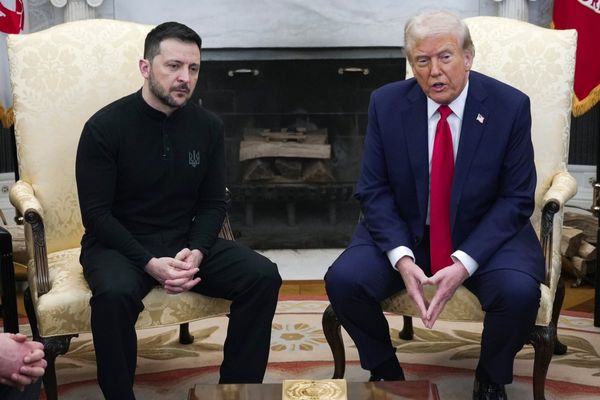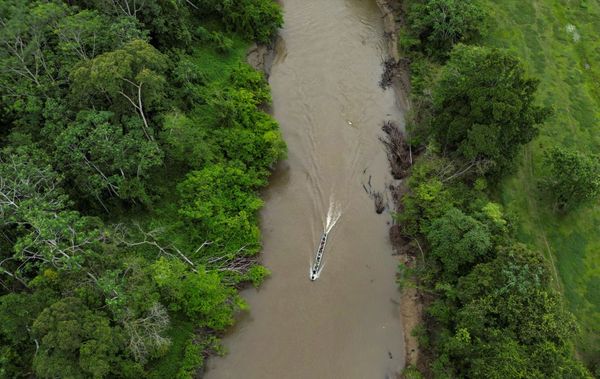
Israeli air raids in southern Lebanon have killed at least 10 civilians, including children, and three Hezbollah fighters, in the deadliest attack in more than four months of cross-border exchanges.
On Thursday, the Lebanese armed group Hezbollah announced retaliation for the strikes, which targeted several towns in southern Lebanon, including areas in Nabatieh governorate, on Wednesday hours after projectiles from Lebanon killed an Israeli soldier.
“The enemy [Israel] will pay the price for these crimes,” said Hassan Fadlallah, a senior Hezbollah official.
More Israeli hits were reported in southern Lebanon on Thursday and caretaker Prime Minister Najib Mikati condemned the escalation.
“At a time where we are insisting on calm and call all sides to not escalate, we find the Israeli enemy extending its aggression,” read a statement from his office.
The attack on Wednesday, which took place deep inside Lebanese territory, has raised fears of a new escalation between Israel and Hezbollah.
In Nabatieh, the attack knocked down part of a building, killing seven members of a family, including a child, the state-run National News Agency reported. A boy initially thought to be missing was found alive under the rubble.
A woman and her two children are among those killed in an attack on the village of as-Sawana.
“It is being described as the biggest escalation in the ongoing confrontations between the Israeli army and the Lebanese armed group Hezbollah,” Al Jazeera’s Zeina Khodr said, reporting from Beirut. She added, however, that the escalation was still “controlled” and both sides were “sending messages” to the other party with their attacks.
While the “battleground” has been along the 120km (75-mile) border, about 4-5km (2.5-3 miles) deep on both sides, Israel “struck deeper” this time, she said.
The United Nations secretary-general’s spokesperson Stephane Dujarric called for a halt to violence.
“The recent escalation is dangerous indeed and should stop,” he said.
Peacekeepers from the UN mission in Lebanon had noticed “a concerning shift in the exchanges of fire between the Israeli armed forces and armed groups in Lebanon”, he said.
US Department of State spokesperson Matthew Miller called for diplomatic efforts to deal with the situation.
“We continue to believe that there is a diplomatic path forward and we will continue to push forward to try to resolve this issue diplomatically,” he said.
The Israeli army said on Wednesday that it had launched an “extensive wave” of air raids on Lebanon.
The attacks came after a barrage of rockets from southern Lebanon hit a military base in Safed in northern Israel, killing an Israeli soldier, identified by the army as Sergeant Omer Sarah Benjo.
In Israel, a rocket fired from Lebanon killed a woman, a government spokesperson said. The barrage hit a military base and wounded several people on Wednesday, the spokesperson said.
Military and political analyst Elijah Maginer said Israel has attacked villages that are considered “very sensitive”, such as those in Nabatieh.
It is “attacking villages that have not been hit before”, Maginer told Al Jazeera.
“So it is an escalation, and I think Hezbollah will respond by the same intensity of the bombardment but without enlarging too much the war,” he said.
This means Hezbollah would likely respect “more or less the limit of the engagement” and not opt for an all-out war, which is also not in the interests of the Israelis, Maginer added.
Hezbollah chief Hassan Nasrallah said on Tuesday that his group’s cross-border shelling would end only when Israel’s “aggression” on the Gaza Strip stops.
The group has been trading fire with the Israeli military across Lebanon’s southern border in support of its Palestinian ally Hamas, which launched a cross-border assault from the Gaza Strip into Israel on October 7, which was followed by heavy Israeli bombardment of Gaza from the land, air and sea.
There are growing fears of another full-blown conflict between Israel and Hezbollah with tens of thousands displaced on both sides of the border and regional tensions soaring.
Cross-border attacks have killed at least 200 people in Lebanon, including more than 170 Hezbollah fighters, as well as 10 Israeli soldiers and five civilians.







